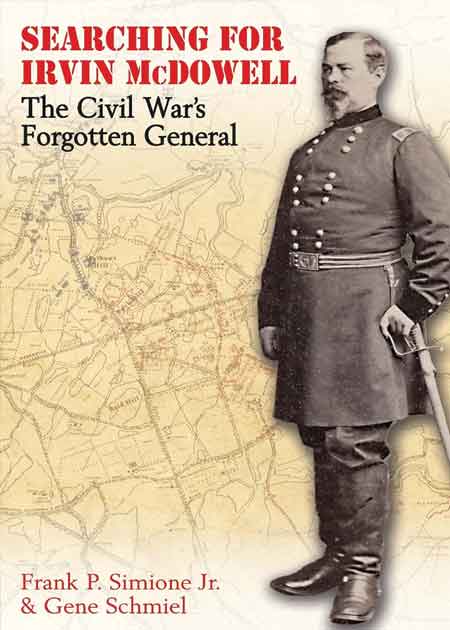By Frank P. Simione Jr., and Gene Schmiel.
El Dorado Hills, CA: Savas Beatie, 2023.
ISBN 978-1-61121-620-2.
Maps. Illustrations. Appendixes. Notes. Bibliography. Index. Pp. xiv, 219.
$22.95
Irvin McDowell is largely remembered as the general who led the Federal army to defeat at First Bull Run. It is less well known that he continued to command a corps for another year or so and played a role in the Union defeat at Second Bull Run, after which he never again commanded combat troops. Nonetheless, he remained in the Army until 1882. How could such a pivotal figure fall into such obscurity?
Part of the answer, as Frank P. Simione, Jr., and Gene Schmiel contend, is that McDowell did not pen an autobiography. Another part of the answer is that he never won a battle and therefore the politicians and the public wanted to forget that he existed. Furthermore, his personality and capabilities led to conflicts with his superiors and underlings, so he had few friends and supporters after the war to help publicize his accomplishments.
Simione and Schmiel noticed this lack of attention and took on the task of discovering what they could about McDowell. Searching for McDowell is the result of this work. The bottom line is that McDowell was a capable staff officer who should not have been given a combat command. They cite very specific examples of actions that he took that brought disaster to the Union Army at both Bull Run battles.
First, McDowell would take off on a mission that he felt was important, and not notify his staff where he was to be found. In 1861, this led Brigadier General Daniel Tyler to blunder into battle at Blackburn’s Ford and the ensuing joint recriminations poisoned the relationship between the two generals. In 1862 at Second Bull Run, McDowell ran off to find Major General John Pope, leaving Major General Fitz-John Porter alone to decide on how best to handle the Confederates on his left flank (it did not help that Pope was delusional about where the Confederates were, and felt that Porter was attempting to sabotage Pope’s efforts).
Second, McDowell would get overly excited and jump into action, forgetting what he knew was really going on, and thereby cause immeasurable harm to his cause. The most severe case of this was in 1862 at Second Bull Run when he ordered Major General John Reynolds to vacate Chinn Ridge, leaving it open for the Confederates to occupy.
Additionally, the authors point out that McDowell was completely apolitical. He did not understand the political inclinations and ambitions of his fellow generals. Finally, he had the bad luck to be placed in the middle of several political feuds, and he was not politically savvy enough to recognize them, nor know how to navigate his way through them.
What the authors point out is that McDowell was the wrong man to lead the army at that time. Unfortunately, he was the one selected and his sense of duty did not allow him to decline the post offered to him. While everyone was also learning how to lead at that point, McDowell was unable to surmount the challenges and faded into obscurity. A fitting anecdote told in the book is that when General William T. Sherman was giving a speech after the war about all the generals that came from the State of Ohio, he does not mention McDowell—a general so forgotten, even his comrades in arms (Sherman served as a brigade commander under McDowell at First Bull Run) did not remember him!
Simione and Schmiel do a nice job in discussing both battles at Bull Run, and this examination of the two engagements forms much of the book’s content. The other part of the book concerns are the Porter hearings about Second Bull Run, where the results were to clear Porter of all charges and strongly implicate McDowell. Aside from this, there is very little additional detail about McDowell’s life and career due to the paucity of written material left by him or about him.
Naor Wallach
Canonsburg, Pennsylvania
